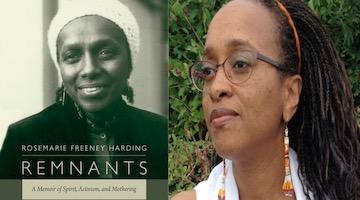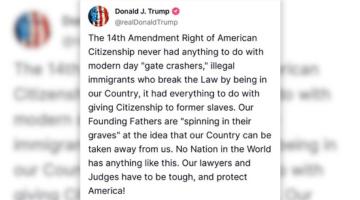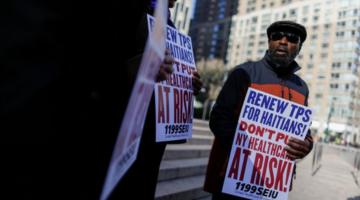“We have lived, and continue to live, in a climate that doesn’t support life.”
In this series, we ask acclaimed authors to answer five questions about their book. This week’s featured author is Fred Moten. Moten is Professor of Performance Studies at New York University.
His book trilogy is called consent not to be a single beingand consists of Black and Blur,Stolen Life, and The Universal Machine.
Roberto Sirvent: How can your books help BAR readers understand the current political and social climate?
Fred Moten:I hope the books can help people see through the grotesque brutality of the present moment to the fact that our current political climate has a long duration. The mention of climates invokes Christina Sharpe’s important formulation, made in her In the Wake, that global black life in slavery’s wake endures the duress of an all but unimaginably terrible weather. We bear the heavy weight of this weather, we’ve been in the storm way too long, which is a condition that even the word “structural” can’t quite capture, and for which no calculation of individual injuries or lost single lives can ever account. But, somehow, we have lived, and continue to live, in a climate that doesn’t support life.It is as if black social life breathes out the air it needs to live in the pockets and folds and spaces it makes, despite seemingly irresistible external pressure and internal strife. This dual condition is cause for mourning and celebration, both of which are necessary for our survival and for our chance to thrive in a general atmosphere of our own devising, in the space we make and share. So, I hope consent not to be a single being contributes to our common understanding of what we have survived, of how we have survived, and of how we might thrive.
What do you hope activists and community organizers will take away from reading your books?
Perhaps we all can take some time to consider that communities do, and ought to, organize themselves; that the activation of community is a common task and practice that need not, and probably cannot, coalesce around the figure/identity of “the activist,” just as what we come to know about our history and our common life never has and never could be adequately constructed around the figure/identity of the scholar. I don’t mean to call into question the sincerity, or to denigrate or disregard the work, of many important and heroic people who call themselves activists, or community organizers or, for that matter scholars. I’m just fascinated by the way our ongoing insurgency is constantly renewed in small groups, on front porches or around kitchen tables, in clubs and lunch rooms, before the figure of the activist or organizer ever comes into relief or flares out from these small, common, social sources. When we attend to that, and remember that, good and important things happen.
We know readers will learn a lot from your books, but what do you hope readers will un-learn? In other words, is there a particular ideology you’re hoping to dismantle?
The great intellectual historian and political philosopher C. B. MacPherson published a book in 1962, the year I was born, called The Political Theory of Possessive Individualism. It’s a classic study of political liberalism and allows us to understand the roots and sources of the notion, which is shared across the spectrum of Western political thought, that the freedom of the individual, grounded in the capacity and enactment of self-possession, is the impetus and end of human life, necessarily conceived of as political. I want to contribute to the ways that what the great intellectual historian and political philosopher Cedric J. Robinson calls “the black radical tradition” un-learns and dismantles that ideology, recognizing that un-learning and dismantling is a by-product—however crucial and necessary—of what it is we seek to learn, and build, and share—black social life.
Who are the intellectual heroes that inspire your work?
First of all, my mom, B. Jenkins. Then, my teachers and mentors—Robinson, Hortense Spillers, Martin Kilson, Julian Boyd, Barbara Johnson, Ann Banfield, William Corbett, Avital Ronell, and Q. B. Bush. Then, there are some great writers, thinkers, artists and musicians, many of whom who constitute and renew the aesthetics of the black radical tradition—Phillis Wheatley, Zora Neale Hurston, James Baldwin, Claudia Jones, Wilson Harris, Édouard Glissant, Amiri Baraka, Gayl Jones, Samuel R. Delany, Gayatri Chakravorty Spivak, Nathaniel Mackey, Jacques Derrida, Ed Roberson, Cecil Taylor, Mary Lou Williams, Betty Carter, Noam Chomsky, Octavia Butler, and so many more. And, also, my contemporaries, whose work I read, and listen to, and learn from, and would like mine to augment in some way—Brent Edwards, Saidiya Hartman, R.A. Judy, Nahum Chandler, Jack Halberstam, Colin Dayan, José Esteban Muñoz, Tiffany Patterson, Erica Edwards, Renee Gladman, Glenn Ligon, Farah Griffin, Maggie Nelson, Barbara Browning, Mark Anthony Neal, Douglass Kearney, David Lloyd, Deb Vargas, Tisa Bryant, LaToya Ruby Frazier, Sondra Perry, Fumi Okiji, and, again, so many more. And, finally, the folks I’ve been lucky enough to collaborate with, venturing out into new directions that single authorship can’t allow or sustain—Laura Harris, Stefano Harney, Wu Tsang, boychild, Arthur Jafa, Suné Woods, James Gordon Williams, Barry Esson and Bryony McIntyre, and Denise Ferreira da Silva. And I really love Shakespeare, too.
In what way do your books help us imagine new worlds?
Hopefully, by writing out of a practice of looking so hard that sometimes, very fleetingly, I’ve been able to see through what I’d been looking at, or listening to. Maybe, these books can become a window for seeing through—not so much to imagine other worlds but to see, as Ed Roberson says, the earth before the end of the world.
Roberto Sirventis Professor of Political and Social Ethics at Hope International University in Fullerton, CA. He also serves as the Outreach and Mentoring Coordinator for the Political Theology Network. He’s currently writing a book with fellow BAR contributor Danny Haiphong called American Exceptionalism and American Innocence: The Fake News of U.S. Empire.



















